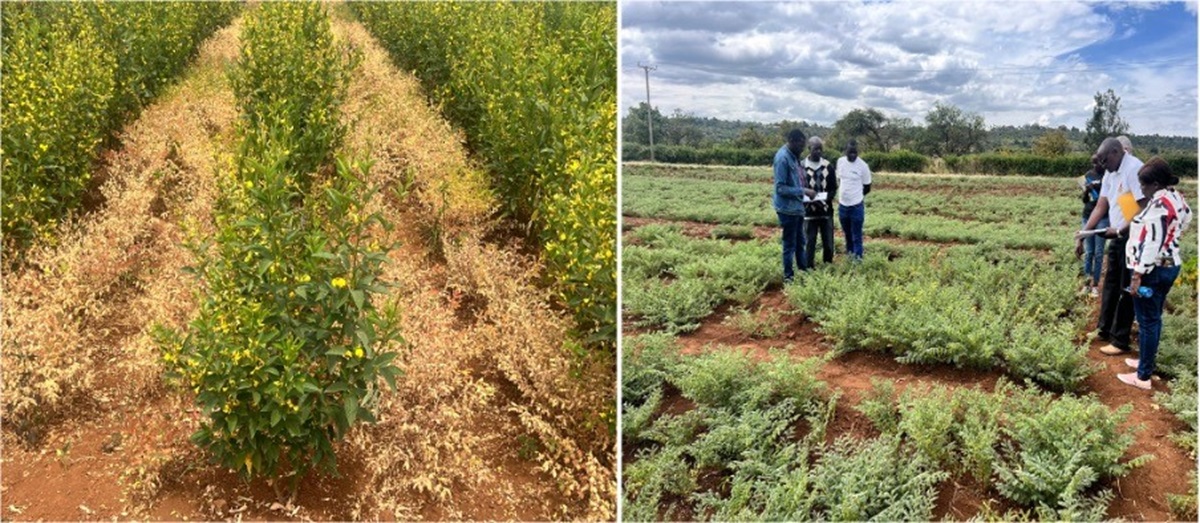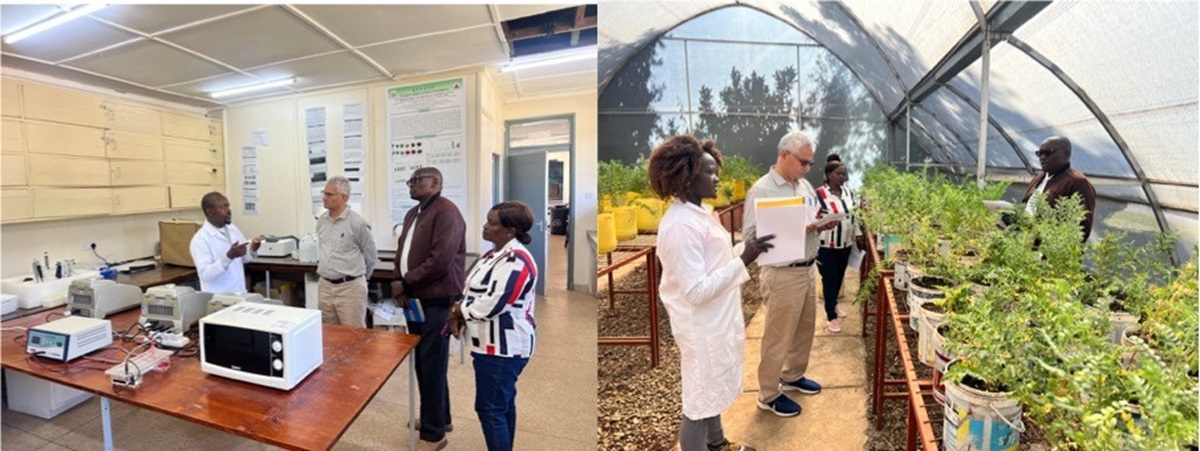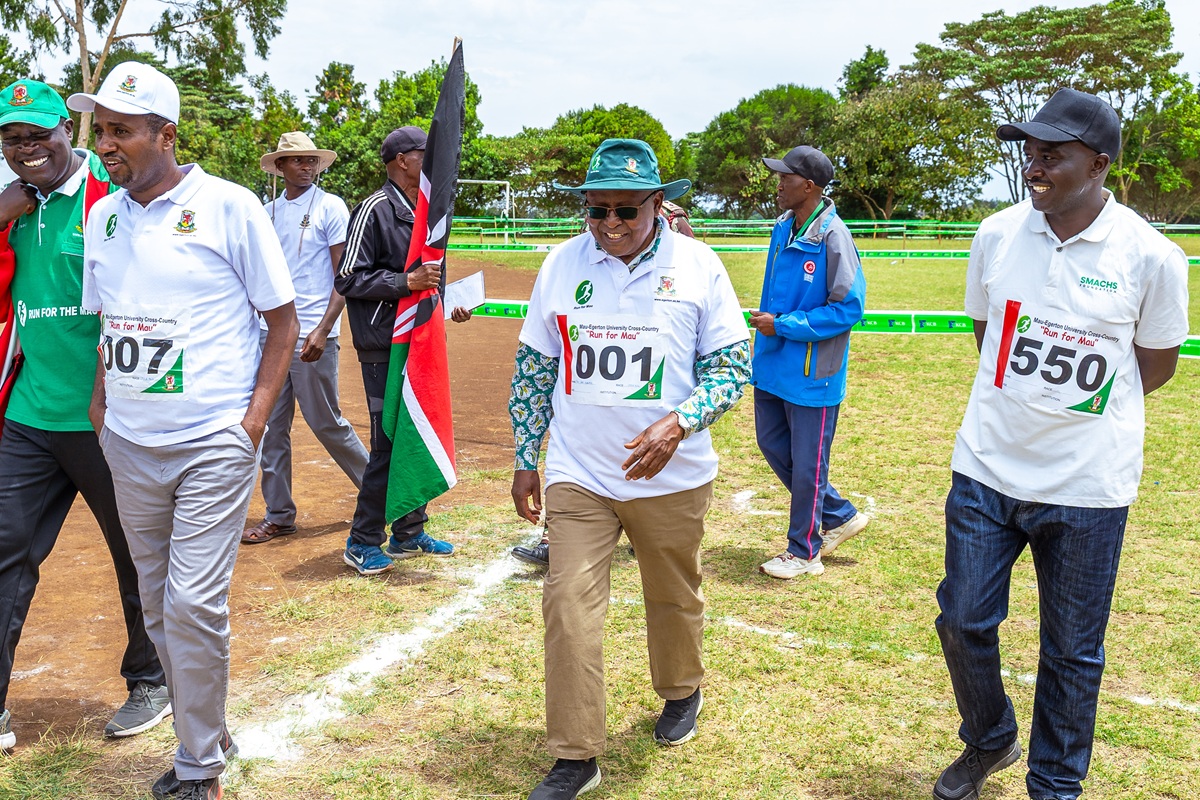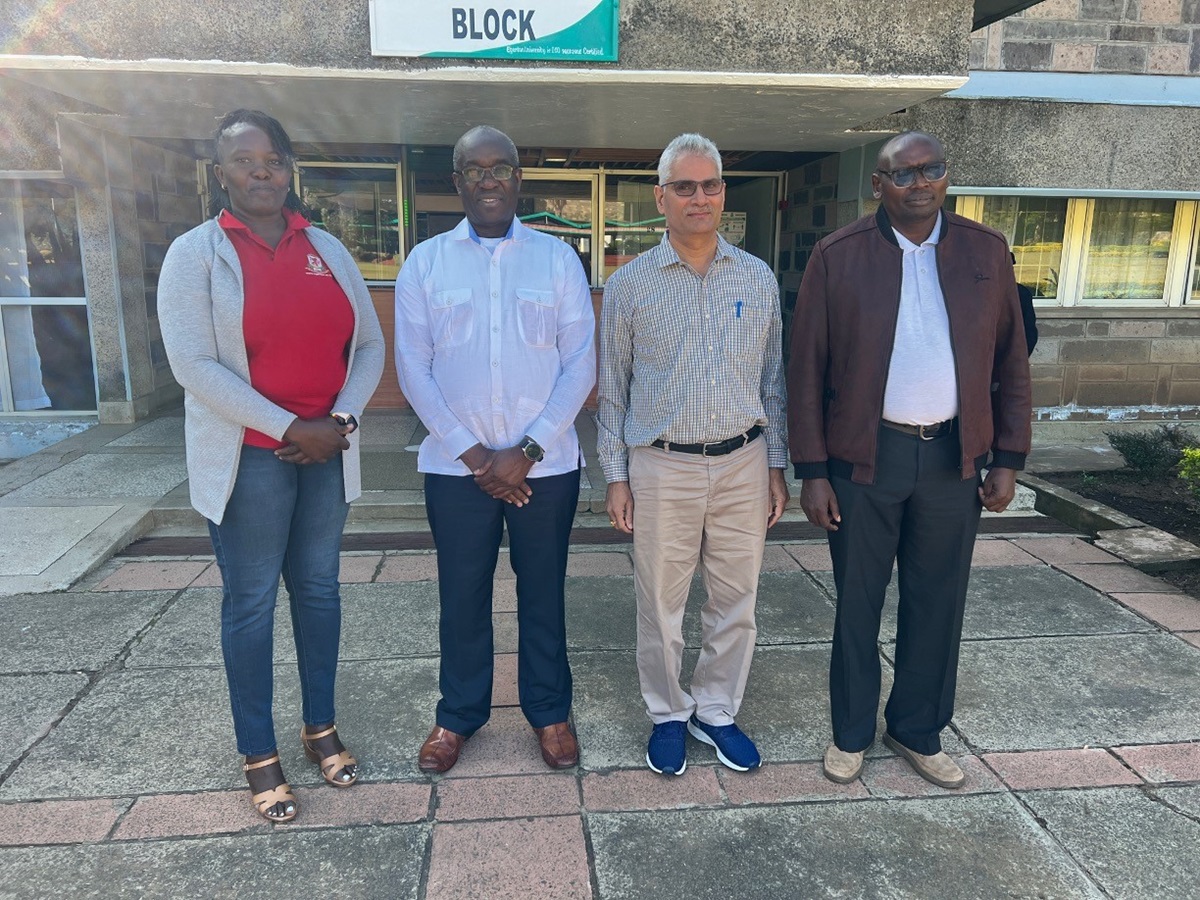The International Maize and Wheat Improvement Center (CIMMYT)-Kenya, a cutting-edge, non-profit international organization dedicated to enhancing the productivity, quality, and resilience of staple cereals like maize, wheat, and associated crops through applied agricultural science and strategic partnerships is collaborating with Egerton University, led by Prof Paul Kimurto, Director Agroscience Park.
The organization which is one of 15 CGIAR centers, engaged in improving the livelihoods of resource-poor farmers in the Global South while promoting sustainable agrifood systems made a courtesy call to the office of the Vice Chancellor Prof. Isaac Kibwage led by Dr. Ganga Rao, a team from the Dryland Crops Program (DCP) that visited the University to evaluate ongoing projects and explore new opportunities for collaboration.

Research Trails in Koibatek, Baringo county; Intercropiing chickpeas and Pigeon peas and also trials for evaluating regional variety trisl of chickpeas
Expressing his gratitude to CIMMYT for its continued support of the Dryland Legumes Program in Kenya through the Accelerated Varietal Improvement and Seed Systems in Africa (AVISA) project, the Vice Chancellor, the Deputy Vice Chancellor in charge of Academic, Research, and Extension (ARE) Prof. Bernard Aduda welcomed the guests, “We are glad that you have prioritized to come here a signal of the value you attach to us as a leading Institution in the region.”
Appreciation for CIMMYT’s Support
“We appreciate CIMMYT’s funding, which has significantly contributed to research on dryland legumes such as chickpea, pigeon peas, and groundnuts. This collaboration has enhanced our research capacity and enabled training and capacity building for our students and staff,” Prof. Aduda said.
Prof. Aduda also acknowledged CIMMYT’s role in establishing the African Dryland Crops Innovation Network (ADCIN), a regional network designed to address dryland crop challenges in sub-Saharan Africa.

Dr Gangarao-CIMMYT Touring Molecular Lab and Research facilities at Agroscience park
Principal Investigator and Director of the Agro-Science Park at Egerton University, Prof. Paul Kimurto, and Dr. Miriam Charimbu were present during the meeting, which centered on strengthening the long-standing partnership between Egerton and CIMMYT. The University has been working with CIMMYT for over 30 years. This is when CIMMYT built the Crop Management and Research Training Centre (CMRT) at Egerton for regional maize and wheat training in the 1990’s and launched by late retired President Daniel Moi.Prof. Aduda proposed reviving joint events at the CMRT complex to maximize its potential as a regional training hub. He also commended CIMMYT’s funding through ADCIN, which has supported research activities, capacity building, and project management training in Ghana, Zambia, and Tanzania.
Expanding Training and Research Opportunities
The Deputy Vice Chancellor requested CIMMYT to provide more training opportunities, including postgraduate supervision and molecular and data management training for students and faculty. He also emphasized the need for CIMMYT’s support in extending innovative products from research to benefit farmers. To further strengthen the partnership, Prof. Aduda tasked Prof. Kimurto and Prof. Mwonga to visit CIMMYT’s Nairobi office for more discussions.
During the visit, Dr. Rao toured Egerton’s Biotechnology, Soil Microbiology, and Soil Chemistry labs. He was impressed by the laboratories’ potential to host visiting scientists in various disciplines, including breeding, crop protection, and soil science. He also noted the significant collection of over 50 Fusarium udum isolates of pigeon pea stored in the Soil Microbiology lab. These isolates, once sequenced and confirmed, will be available for research partners.
Addressing Challenges and Enhancing Research Facilities
In the greenhouse, Dr. Rao examined both pigeon peas and chickpeas where sixteen chickpeas crosses made using an Australian parent for root traits for enhancing drought tolerance for Kenyan varieties which are always affected by drought. Some of the crosses are nearing maturity and will be harvested and multiplied for screening in different production sites including Nakuru, Bomet, Meru, Baringo, Elgeyo Marakwet and Laikipia, as rotational crop. However, it was noted that the greenhouse experiences high temperatures, causing heat stress to the plants. To address this challenge, Egerton University requested CIMMYT’s support to install temperature and humidity control systems.

Irrigation system at Agroscience park and Ascochyta, fusarium wilt and root rot screening plot
Dr. Rao also visited the Agro-Science Park, where he observed four acres of chickpea under seed multiplication. He noted that the dry January season posed irrigation challenges, affecting optimal production. He also visited the Ascochyta Blight (AB) screening hotspot and the site designated for chickpea Fusarium wilt for regional African Dryland Crops Innovation Network (ADCIN) breeding germplasm. This is also one focused trait to be included in accelerating yields. Additionally, he toured the seed storage facility and recognized the need to complete the cold storage to maintain seed quality.
Regional Screening and Seed Multiplication at Koibatek ATC
At the Koibatek Agricultural Training Centre (ATC), Dr. Rao inspected four acres dedicated to pigeon pea and chickpea seed multiplication and regional screening. He commended the demonstration of pigeon pea/chickpea and pigeon pea/groundnut intercrops. The site also hosts 100 chickpea lines from Ethiopia and Tanzania under regional screening, with similar materials shared with researchers in Tanzania. Breeder seed multiplication for the MPESA variety is also ongoing. CIMMYT was requested to continue supporting infrastrure development including the installation of temperature and humidity controls in the greenhouse, the completion of cold storage at the Agro-Science Park, the establishment of disease screening plots for Ascochyta, Fusarium wilt, and root rot, and the refurbishment of irrigation systems at both the Agro-Science Park and Koibatek ATC.
Prof Aduda highlighted several priority needs to strengthen the collaboration with CIMMYT which has been strong on wheat and maize programs since 1990s when CIMMYT build the Crop Management and Research Training Centre (CMRT) complex for Regional training on Maize and Wheat programs in East and Southern Africa in collaboration between Egerton, CIMMYT and KALRO.
Prof. Aduda reiterated Egerton University’s commitment to advancing agricultural research through continued collaboration with CIMMYT. He expressed optimism that the partnership would yield innovative solutions to dryland crop challenges, benefiting farmers and communities across sub-Saharan Africa.
For More details reach out:
Kurian Musa, on email:
Egerton University website: www.egerton.ac.ke








